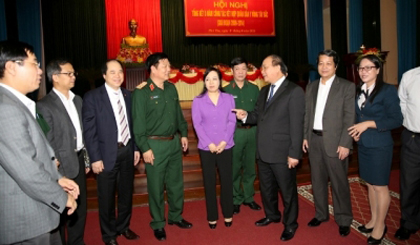Deputy PM Phuc urges diversifying military-civilian medical co-operation
Deputy Prime Minister Nguyen Xuan Phuc has urged increasing the effectiveness of the combined military-civilian medical model in the northwestern region to improve the quality of care for people and soldiers.
 |
| Deputy PM Nguyen Xuan Phuc talks with delegates at the event. (Image credit: VGP) |
The Northwestern Steering Committee in collaboration with the Ministry of Defence, Ministry of Health, and Military Region 2 co-organised a seminar in Phu Tho on April 9 to review the five year implementation of the combined military-civilian medical model in the northwestern region in the 2009-2014 period.
Over the years, the combined forces have offered healthcare to millions of people in the region. In particular, military units under Military Region 1, 2 and border posts have provided medical care for approximately 997,000 people, while offering first-aid to over 38,000 and treating nearly 400,000 patients living in their stationed areas.
Chairing the event, Deputy PM Phuc, who is also head of the Northwestern Steering Committee, praised positive results in implementing the combined forces over the past years, contributing significantly to the protection and care of people's health, socio-economic development and national defence and security through military-civilian medical centres, combined military-civilian clinics at the grass-root level, and integration of military-civilian medical forces in protecting people and soldiers’ health.
The deputy PM urged relevant ministries and local authorities in the region to effectively implement solutions to enhance the effectiveness of the combined model, particularly in improving the capacity of military-civilian healthcare committees at all levels, ensuring access to quality medical services for local people in the northwest, diversifying forms of combination to promote effectiveness of the model, and ensuring the sustainability of financial resources for operations.
To promote the practical effectiveness of the co-operation model in the future, Minister of Health Nguyen Thi Kim Tien stressed the need to consolidate military-civilian medical networks with a focus on manpower and facilities for medical examination and treatment, especially improving the capacity of health workers in military zones.
Delegates at the conference also discussed solutions to strengthen the healthcare sector serving defence and security and proposed more support mechanisms for healthcare workers in remote and disadvantaged areas in the northwestern provinces.
On the occasion, the Northwestern Steering Committee presented merit certificates to 63 collectives who have made outstanding achievements in the work of combining military and civilian forces in providing medical care for locals and soldiers in the region during the 2009-2014 period.
(Source: nhandan.org.vn)
 về đầu trang
về đầu trang






